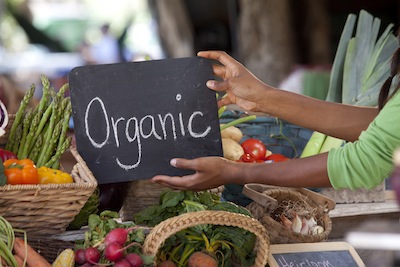As an oncology nutritionist, I meet with people throughout the stages of treatment, recovery, and survivorship. The relationship between food and cancer is an ever-developing and popular field, and because of this, the people I meet with tend to have many questions. The following are a few of the most common questions I’m asked.
This is another question without a simple answer… Basically, it depends. First, it depends whether we’re talking about produce or animal products. For produce, choosing organic products is a way to decrease exposure to pesticides. To understand the effects of pesticides on health, it can be helpful to think about this from an environmental health perspective, where exposure “x” causes disease “y”. Exposures cause disease in two ways, either through a high-dose, which will cause an acute reaction or through low-dose, chronic exposure, which cause disease following a latency period of a number of years. In either instance, a threshold of exposure must be reached in order to cause disease.
In the case of pesticides and disease risk, acute diseases, often neurological, are observed in populations with very high exposure to pesticides, such as the workers who administer the chemicals or their children. Diseases from low-dose, chronic exposure to pesticides are much harder to define. Because we are exposed to so many toxins over our lifespans, it is very difficult to match specific pesticides with their respective long-term effects. The best way to manage living in a world rife with various health-harming compounds, other than being surrounded by a bubble, is to reduce exposures as reasonably able. For some, who can afford it, this may mean buying only organic produce.
I’m lucky to live in New York City, with farmer’s markets full of reasonably priced organic or low-spray fruit and vegetables. Unfortunately, in many parts of the country, organic foods are very expensive or difficult to find. One thing we know for sure is that the benefits of eating fruit and vegetables outweigh the potential harms of very low-dose pesticide exposure, so it is certainly most important to eat these foods, whether or not they are organic. The answer to this question really boils down to: it depends on the options available to you and your financial situation. When making decisions on which foods to buy organic versus conventional, it can be helpful to reference the Environmental Working Group’s “dirty dozen” and “clean fifteen”, which provide information on the produce with the highest and lowest pesticide residues.
Organic versus conventionally raised animal products bring up an entirely different set of issues. Here, the primary concern is not pesticides, but what the animal is fed and how it is raised, whether the animal has been given synthetic growth hormones, and whether the animal has been treated with antibiotics. (Conventional livestock farming is a loaded topic, and if you want to learn more than I’m able to cover here, I recommend reading Food Inc. or watching the documentary.) Unlike organic produce, which does not seem to differ nutritionally from its conventional counterpart, products from animals that have been fed grass instead of feed, made, typically, from soy and corn, are higher in omega-3 fatty acids and other health promoting compounds.
Although many consumers are worried by the growth hormones given to conventionally raised animals, these are not actually active in humans. (There is some concern, without proper evidence to form a conclusion, that animal products from animals given growth hormones may increase levels of the growth hormone IGF-1 in humans, which has been linked to some cancers.)
The antibiotics given to conventionally raised animals are problematic for two reasons. One is that the widespread use of these drugs guides the development of bacteria that are resistant to antibiotics and are, therefore, tremendously more harmful to both animals and humans. The second issue is that antibiotics promote growth. In addition to treating or preventing disease in crammed, unsanitary spaces, growth promotion is partly why antibiotics are administered. Unfortunately, eating these foods may make humans prone to growth or weight gain, as well.
The benefits to choosing organic animal products are clear. Though, as many consumers are aware, they are significantly more expensive than conventional products. I recommend a diet based in plant-foods, and if making the switch from an animal-based diet, this should confer financial savings to cover the cost of more expensive meats and dairy. Alternatively, reducing intake of animal products as part of a plant-based diet, immediately reduces exposure to the elements of concern in conventionally farmed animals. As the goal is to reduce exposure as able, either of these alterations is effective.
Alexandra Rothwell, MPH, RD, CSO, CDN
Alexandra Rothwell is registered dietitian, with a specialization in oncology nutrition. She currently works at Mount Sinai’s Dubin Breast Center, in New York City, primarily consulting with breast cancer patients throughout treatment and survivorship. Previously, she worked with patients of head and neck cancer, bone marrow transplant, gastric, colon, and prostate cancer, among other malignancies. She has completed her Masters of Public Health from Mount Sinai’s Ichan School of Medicine and received her nutrition education from New York University.
